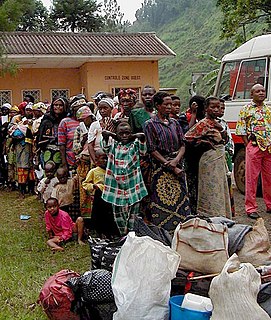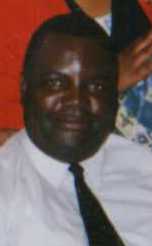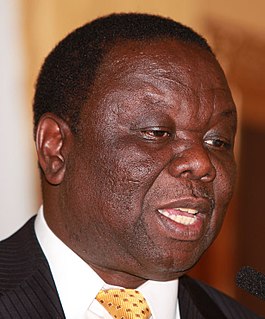Air Commodore (retired) Mike Tichafa Karakadzai (Name 'Karakadzai' origin from Madagascar) (7 March 1957 – 19 August 2013) was a former senior officer in the military of Zimbabwe. Europe, and more recently Australia, have frozen his assets and forbidden his travel in their territories.

Zimbabwe, officially the Republic of Zimbabwe, is a landlocked country located in southern Africa, between the Zambezi and Limpopo Rivers, bordered by South Africa, Botswana, Zambia and Mozambique. The capital and largest city is Harare. A country of roughly 16 million people, Zimbabwe has 16 official languages, with English, Shona, and Ndebele the most commonly used.
- Karakadzai means remember in the Ndau language of Eastern Zimbabwe.
Karakadzai qualified for a Graduate Diploma in Purchasing and Supply from the Chartered Institute of Purchasing & Supply in the United Kingdom. He obtained an MSc in Strategic Management from the University of Derby. He attended the Royal College of Defence Studies in the United Kingdom where he obtained an MSc in Defence Strategic Studies. He was appointed Deputy Secretary for Policy and Procurement in the Zimbabwe Ministry of Defence in 2000. [1]

The United Kingdom (UK), officially the United Kingdom of Great Britain and Northern Ireland, is a sovereign country located off the north-western coast of the European mainland. The United Kingdom includes the island of Great Britain, the north-eastern part of the island of Ireland, and many smaller islands. Northern Ireland is the only part of the United Kingdom that shares a land border with another sovereign state, the Republic of Ireland. Apart from this land border, the United Kingdom is surrounded by the Atlantic Ocean, with the North Sea to the east, the English Channel to the south and the Celtic Sea to the south-west, giving it the 12th-longest coastline in the world. The Irish Sea lies between Great Britain and Ireland. With an area of 242,500 square kilometres (93,600 sq mi), the United Kingdom is the 78th-largest sovereign state in the world. It is also the 22nd-most populous country, with an estimated 66.0 million inhabitants in 2017.
The University of Derby is a public university in the city of Derby, England. It traces its history back to the establishment of the Derby Diocesan Institution for the Training of Schoolmistresses in 1851. It gained university status in 1992 as one of the new universities.

The Royal College of Defence Studies (RCDS) instructs the most promising senior officers of the British Armed Forces, Her Majesty's Diplomatic Service and Civil Service in national defence and international security matters at the highest level, to prepare them for the top posts in their respective services. It forms part of the Defence Academy of the United Kingdom, and is its most senior and prestigious component. In addition, there are many overseas attendees these days, who are close allied to the United Kingdom government.
In October 2002 the United Nations published the Final report of the Panel of Experts on the Illegal Exploitation of Natural Resources and Other Forms of Wealth of the Democratic Republic of the Congo. The report said Karakadzai had the position of Deputy Secretary of COSLEG, which the United Nations described as "a Congo-Zimbabwe joint stock company ... a key vehicle for military-backed commerce involving mostly diamonds, banking and timber in the Government-held areas". It named Karakadzai as a key player in arranging a January 2001 deal with John Bredenkamp's Tremalt whereby Tremalt obtained copper mining resources in the DRC at a nominal price in exchange for paying a share of proceeds to the governments of the DRC and Zimbabwe. Some of the payments were to be made in the form of military equipment. [2]

The United Nations (UN) is an intergovernmental organization that was tasked to maintain international peace and security, develop friendly relations among nations, achieve international co-operation and be a centre for harmonizing the actions of nations. The headquarters of the UN is in Manhattan, New York City, and is subject to extraterritoriality. Further main offices are situated in Geneva, Nairobi, Vienna and The Hague. The organization is financed by assessed and voluntary contributions from its member states. Its objectives include maintaining international peace and security, protecting human rights, delivering humanitarian aid, promoting sustainable development and upholding international law. The UN is the largest, most familiar, most internationally represented and most powerful intergovernmental organization in the world. In 24 October 1945, at the end of World War II, the organization was established with the aim of preventing future wars. At its founding, the UN had 51 member states; there are now 193. The UN is the successor of the ineffective League of Nations.
John Arnold Bredenkamp is a Zimbabwean businessman and former rugby player. He is the founder of the Casalee Group.
Tremalt Limited was a mining company incorporated in the Democratic Republic of the Congo (DRC). It was the vehicle for a highly criticized deal in 2001 in which it bought copper assets at far below their estimated value in return for a private agreement to pay a share of profits to the DRC and Zimbabwe governments. Allegedly some of the payments were made in the form of military equipment. The company made few investments in its assets, several of which the DRC government took back. In 2006 it was sold for about $60m.
Karakadzai was named in February 2004 by the European Union as being among Zimbabwe government members whose assets must be frozen by members and who would be barred from entry or transit by members of the union. [3] In December 2008 Australia added him to its list of targeted sanctions against those responsible for the human rights abuses in Zimbabwe. [4]
On 1 November 2005 Karakadzai was appointed General Manager of the National Railways of Zimbabwe. [1] In February 2011 President Robert Mugabe said that Karakadzai would be in charge of his reelection campaign in Harare, at a date to be announced. Sources said this was likely to be a very violent campaign. [5] In May 2011 Karakadzai said that lack of credit from foreign lenders was preventing the National Railways of Zimbabwe from replacing aging equipment. He blamed this on illegal sanctions imposed on the country by the west. [6] He died in a car accident on 19 August 2013 in Matebeleland after his vehicle hit a cow and overturned. [7]

Robert Gabriel Mugabe is a Zimbabwean revolutionary and politician who served as Prime Minister of Zimbabwe from 1980 to 1987 and then as President from 1987 to 2017. He chaired the Zimbabwe African National Union (ZANU) group from 1975 to 1980 and led its successor political party, the ZANU – Patriotic Front (ZANU–PF), from 1980 to 2017. Ideologically an African nationalist, during the 1970s and 1980s he identified as a Marxist–Leninist, although after the 1990s self-identified only as a socialist. His policies have been described as Mugabeism.

Harare is the capital and most populous city of Zimbabwe. The city proper has an area of 960.6 km2 (371 mi2) and an estimated population of 1,606,000 in 2009, with 2,800,000 in its metropolitan area in 2006. Situated in north-eastern Zimbabwe in the country's Mashonaland region, Harare is a metropolitan province, which also incorporates the municipalities of Chitungwiza and Epworth. The city sits on a plateau at an elevation of 1,483 metres above sea level and its climate falls into the subtropical highland category.










